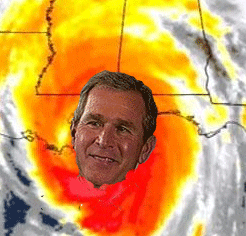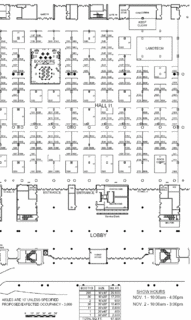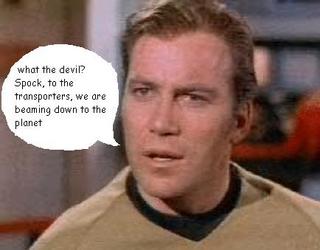"In every disaster FEMA is in, you love us in the beginning, then you get mad. We do such a good job that you expect us to do everything, and we can't." FEMA's Michael Brown, March 28, 2005, Port Charlotte High School auditorium, Florida.
Calling for the head of equine lawyer and FEMA poster boy
Michael Brown is like viewing a mob hit in Vegas and demanding that Francis Ford Coppola be held accountable.
Not that Mr. Brown should not be elevated to the Supreme Court or other face-saving appointment. But it was clear last year in Florida that the agency he was supposed to be in charge of had deeper problems than
managerial incompetence.
FEMA's absence of accountability, for example, is unaccountable. As we discovered one hot morning a few days after Hurricane Charley had put a small part of Florida in harm's way. After a couple of false starts, FEMA had opened its operations center in Port Charlotte. People came in and were given numbers. They were then invited to use phones on scattered tables to call FEMA's 800 number in Washington DC.
One monitory signal: the FEMA people "on the ground" did not know that the FEMA people in Washington didn't start answering the "24-hour" FEMA emergency phone until 8 a.m. A few of us who tried calling got the agency's answering machine explaining as much.
Many of the people in the room had homes that were destroyed or sustained major damage. None of the FEMA people so much as made eye contact with them, let alone explained what we were doing. Once the lines began to open, we got taped messages informing us that the purpose of the call was to go through a 30-minute-or-so interview in which a person at a computer in Washington would take our basic information and create a case number.
When we finally reached an allegedly living FEMA representative, the first thing we learned was that we'd need to write down our case numbers in order to proceed with any claim or loan. We were also told that the interview would result, invariably, in a letter from FEMA denying our claims. We were told to ignore that, as it was simply part of the routine.
So we sat there at tables in the recreation center, making our calls. When it became evident that we would need to write down case numbers, I asked for a pencil. I hadn't come with one, nor had most other people.
FEMA had not brought pencils.
Not such a hopeful sign: An agency whose prime directive is to address immediate need in the face of a catastrophic event, a crew of freshly scrubbed professional emergency workers in crisp blue shirts, failing to bring the only things everyone undergoing their process would be sure to need: a pencil and a piece of paper.
A black woman who had finished her interview gave me her pen.
As I left the "operations center," I saw a line stretching out into the parking lot. The sun was already harsh and hot. No one on the line was offered water. No attempt was made to let the line move inside and snake around the lobby. No one told them (well, I tried) that the only thing they would receive inside was an 800 phone number, which could have been called from anywhere, which would eventually issue in a letter denying them any assistance, at which time they could play Bureaucratic Nightmare, but only if they managed to record their case numbers. They and their kids baked in the sun for hours blissfully unaware.
Later I met FEMA folk brought in from as far away as Hawaii, who were put up in expensive condos - one guy had a 3 BR condo that could have housed a family whose home had been lost. Another guy had a rental car, and was using his agency's supply of bottled water to keep it from overheating. We've all heard the stories.
There is no way Michael Brown "caused" this void where a community of people should have been. It is difficult to imagine what concatenated effort had to occur to produce an emergency agency chock full of personnel that had no practical acquaintance with what an emergency is. The deer-in-headlight stares suggested the real emergency for FEMA was having to look like it was handling an emergency.
Despite everything that has been learned since last year about FEMA's
incompetence, at a meeting last March, Florida legacy
elected official Connie Mack IV introduced Michael Brown to a small group of Floridians who were not entirely pleased with FEMA (or with Jeb Bush for that matter) by telling them "FEMA did a fantastic job." Brown was supposed to be there to hear from the very people his agency failed that this was not the case. But in the world of Bushes and Macks, that moment of hearing never comes, and there is never a pencil to record its misadventure.
So, just for what it's worth, whether Brown is put out to pasture or not, the enabling factors that made him and his agency's catatonic debacle possible were visible last year, and will all still be in place after he's gone.
Even Bush's staring into a mirror isn't quite it.
The only other time I saw hurricane behavior in Florida achieve
FEMATIC levels was among Florida drivers waiting in line on long gas lines. Lines of cars backed up at the few stations that had some gas, and invariably there would be within view a station across the road that seemed to not have long lines, but a steady stream of cars nonetheless. It seemed improbable that so many cars would be going to an empty station, but in fact that is what was happening. Lines would form, each car would drive up in turn to the pump, try all the levers, discover there was no gas, and move on, leaving the next driver to make the same discovery.
The striking thing here was the remarkable breakdown in communication. It would have taken one sign on the pump, or better, on the station's marquis, to save hundreds of gas-starved people the experience of learning an identical thing, over and over. Any single driver could have hollered or made signs to the folks behind indicating the pump was empty. Somehow it was like the very option of giving voice to another was unavailable. Language had not yet been discovered. There was no other. Or maybe no one had a pencil.
Something catastrophic seems to happen to human literacy in certain conditions in this country. War being one of those conditions. Addressing emergencies has to begin by assuming the worst case. Removing the head (Brown or Bush) assumes that the aphasia that strikes us in the US -- us with our lack of us, our lack of community -- will thus be cured. It will only further conceal the loss of voice in which every bureaucracy has its end and its beginning.

















